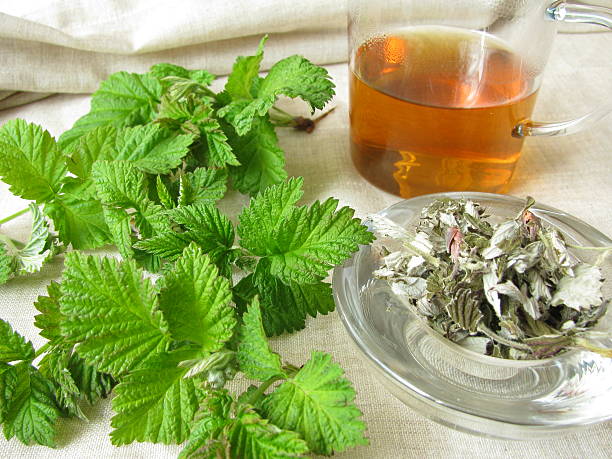Raspberry leaf tea

Raspberries are red berries native to Europe and Asia. The leaf is used to make herbal tea with the same name. Over the years, raspberry leaf tea has been used to treat various ailments and facilitate childbirth. Evidence of its benefits needs to be stronger, and more research must be done to evaluate its efficacy.
You can buy the tea in loose leaves, bags (make sure they are made of 100% leaves), or tablets. You can also make your infusion by using dried raspberry leaves. The astringency in the leaves creates a tea that tastes similar to black tea. Commercial blends combine the leaf with sweeter herbs, like peppermint.
How to make raspberry leaf tea
Bring water to a boil in a small saucepan and let it cool down. Cover and steep the tea for 15-30 mins. Strain and sweeten according to taste. You can dry leaves by collecting them during or soon after flowering.
Learn more about our health benefits guides and the profiles of the other teas we offer, such as green tea, rooibos, chamomile, ginger, and peppermint.
Benefits of drinking raspberry leaf tea
The leaves of the raspberry plant contain vitamins C, E, and B and minerals such as calcium, magnesium, and zinc. The leaves also contain plant compounds that protect them, such as bioflavonoids. The herbal infusion does not contain caffeine.
Source of antioxidants
Polyphenols, plant compounds, are known to protect against diseases. These compounds are also crucial for a balanced, healthy diet. The antioxidizing polyphenols in raspberry leaves, namely tannins, alkaloids, and bioflavonoids, are believed to relax and tone pelvic and abdominal muscles. Despite having lower levels than black or green tea, raspberry leaf tea contains polyphenols comparable to white wine and fruit drinks.
Digestive support
Raspberry leaf tea can help with indigestion, bloating, and diarrhea. The tea is believed to have a mild diuretic action which can help reduce bloating caused by fluid retention.
Relief from mouth ulcers, sore throats, and gum disease
This astringent tea can be used as a Mouthwash to relieve mouth ulcers, sore throats, and gum disease.
Alleviates inflammation
In the past, a raspberry leaf infusion was used to treat inflammatory eye conditions like conjunctivitis. It is also used topically for skin rashes.
Menstrual cramps and water retention
The raspberry leaf is rich in fragrance, which tones and tightens the muscles around the pelvic region. It may reduce mild cramping. The research is limited, but anecdotal evidence suggests that the tea can ease cramps.
Infusions are also thought to have mild diuretic effects and can reduce puffiness caused by water retention in pregnancy and menstruation.
Supports late-stage pregnancy
The raspberry leaf, a popular choice during pregnancy, is believed to tone and strengthen the uterus. This could facilitate labor. The evidence that raspberry leaf is safe is not strong, and more research will be needed to determine its effectiveness.
It is believed that if taken as a tea every day (1-3 mugs per day) starting around week 32 of pregnancy, it will prime the uterus, increasing blood flow while toning uterine muscle. Mums-to-be should consume it early enough or close to the due date.
Morning sickness
Some reports indicate that raspberry leaf tea can help to ease morning nausea. As sickness symptoms are usually worse in the first trimester and improve by the second, it is best to consult your midwife before consuming this tea. It is not advised to drink raspberry leaf tea during early pregnancy.
Assists during childbirth
Some studies indicate that drinking raspberry leaf tea can help improve labor outcomes and reduce the need for interventions such as a C-section and a forceps birth. This could be due to an increased tone and better functionality of the uterine muscles.
Perimenopausal menstrual flow
Raspberry leaf tea may reduce cramps and heavy menstrual flows.
Does raspberry leaf tea have any side effects?
Raspberry leaf tea is mild and safe for most adults who are healthy. Consuming 1-3 cups of raspberry leaf tea daily in small amounts seems sufficient. It is not recommended for young children or adults under 18.
According to the European Medicines Agency, the tea can remedy mild period cramps and mouth or throat irritation. It also helps with diarrhea. The EMA needs to be able to provide more evidence for their findings. However, the EMA based its conclusion on the ‘traditional’ use of the herb.
While clinical studies haven’t found an increased incidence of adverse pregnancy outcomes in pregnant women, there is still insufficient evidence to prove its safety and efficacy. Raspberry leaf tea is still a popular choice for pregnant women and has been used for a long time.
If you are pregnant and meet one or more of the criteria below, avoiding drinking raspberry leaf is best.
Suffer from health problems such as high blood sugar or gestational diabetes.
Expect a breech delivery.
You are nearing your due date.
Have performed short-term labor for 3 hours or less.
I have had a previous preterm birth.
Have a planned C-section or had a C-section previously.
You have experienced bleeding during the second half of your pregnancy.
Anyone with a history of endometriosis, fibroids, or breast or ovarian carcinoma should avoid tea.
You may also experience a mild laxative or diuretic effect.
Final thoughts
Even though raspberry leaf tea has been used for centuries, little is known about how it works. The benefits of raspberry leaf tea depend on the herb preparation and the stage at which the tea is taken.
Speak to your midwife, doctor, or doula before taking the capsules or drinking the raspberry leaf infusion if you’re pregnant.





